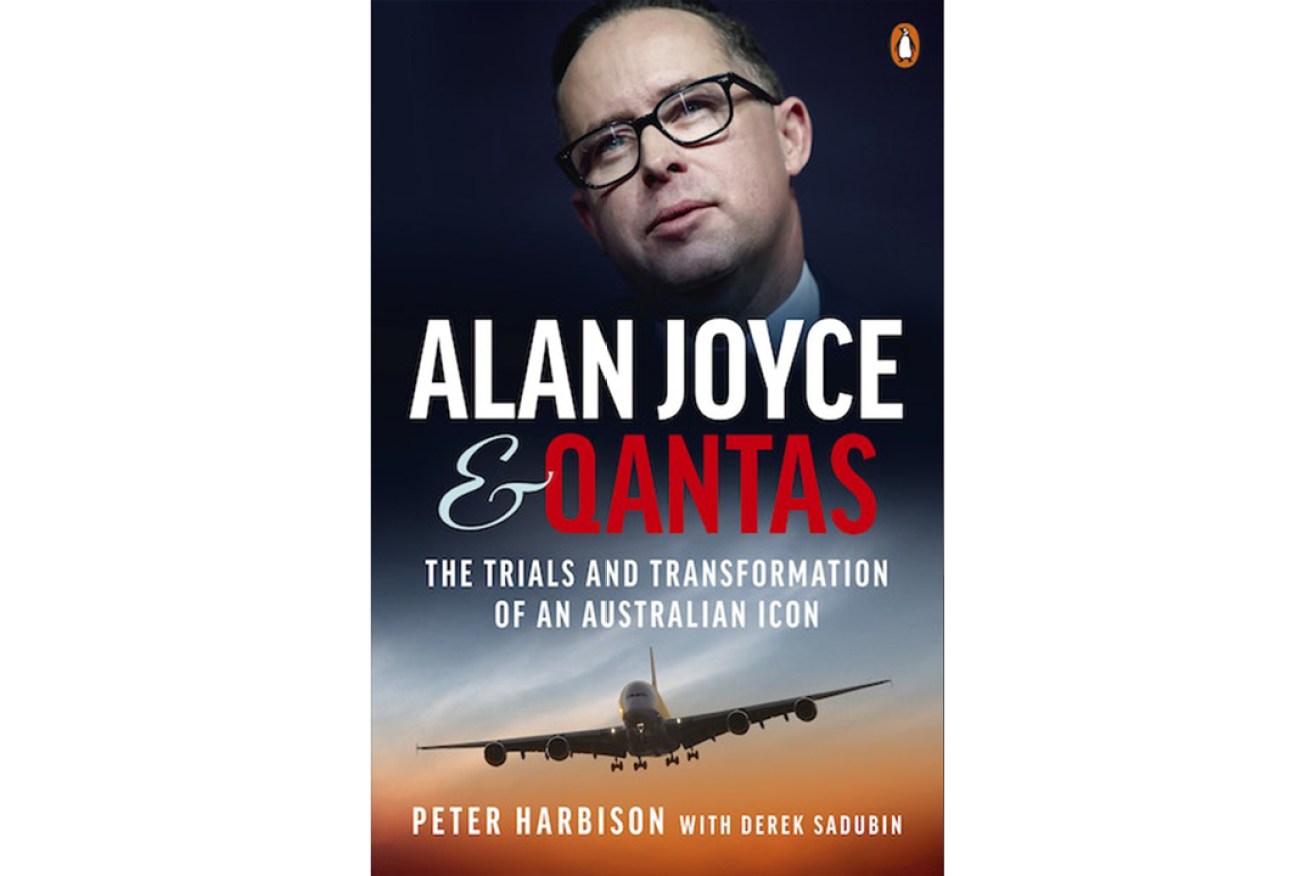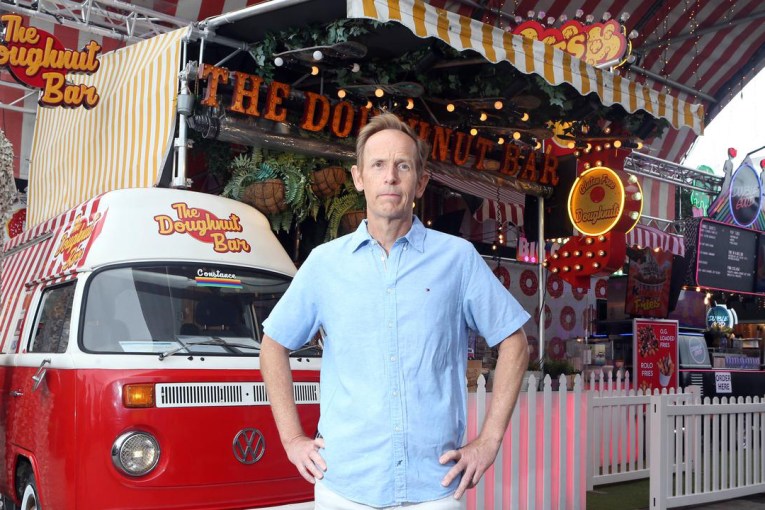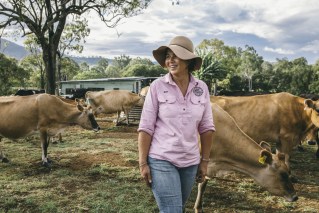An extract from Peter Harbison’s retrospective Alan Joyce and Qantas
In today’s summer reading extract, Peter Harbison and Derek Sadubin look back on Alan Joyce’s childhood growing up in a working-class Irish family, his meteoric rise to become CEO of Jetstar at 36 and his controversy-filled tenure at Qantas.

Most Australians, if asked to name the CEOs of two Australian companies, would probably fall short by one – but the one they would know is the CEO of Qantas. Australians are obsessed with Qantas. And by 2023, after his fifteen years running the airline, Alan Joyce had become synonymous with the flying kangaroo.
This addiction to the brand implies many things, positive and negative. But there are few Aussie flyers who aren’t afflicted by one or other of the side-effects. ‘Twas ever thus. Qantas has rarely ever been out of the headlines. As Joyce’s predeces- sor, Geoff Dixon, once said, ‘I don’t think any other company in Australia attracts such divided opinion and outcry. Everybody in Australia still believes they own Qantas.’
Love it or hate it, feelings run high about the national carrier. It’s an iconic brand, it’s an airline, it’s ours and it’s an employer (or not). More recently, it’s a destroyer of the environment, it’s a rip-off, it’s ‘I’ll never fly with them again’, it’s ‘Feels like home’ or . . . it’s that Alan Joyce.
Many travellers have never known a Qantas where Alan Joyce was not the CEO. It’s been that long. He appeared on the hori- zon when he first headed the start-up Jetstar subsidiary in 2004, but it was only after winning the Qantas prize in November 2008 that he began to accumulate the notoriety that would ultimately surround him.
Part of that has to do with the enormous obstacles he’s had to negotiate during his decade and a half at the helm, but probably more importantly it’s the way he’s led the organisation. To an objective outside observer, under Joyce’s leadership Qantas has evolved from a fragile and overweight company to an almost bulletproof, profitable operation that is fit for purpose in today’s world. To an insider, it can often seem a brutal and uncaring colossus.
In its 2008 manifestation, it could survive. But years of inadequate domestic competition from a ponderous Ansett Airlines and the support of a protectionist international policy through the 1990s had allowed Qantas to be mildly profitable without being efficient.
Some years later, Qantas chairman Leigh Clifford observed that there had been little appetite within the company for serious reform at the time. Clifford himself has never shied away from making the tough call. ‘Frankly I think too often Qantas has pissed at the edges in the past about costs,’ he said in a media interview in March 2014.
As low-cost airlines appeared on the scene and international challenges swelled, Qantas was on track for a steep decline. Only a very smart move in 2004 to create a low-cost subsidiary, Jetstar, had allowed Qantas to fend off the upstart Virgin Blue.
In retrospect, it was brutally fortunate that the deterioration within Qantas was hastened by the global financial crisis. And that’s where Joyce’s professional and personal qualities made the difference. He has his failings – he’s human – but he also has a mix of qualities that has helped set Qantas up for the future. And that’s what this book is about.
As a company, Qantas is part of an intensely complex array of activities, spending billions of dollars on big, shiny jets, engaging with a dozen or more unions, negotiating with governments and intermediaries, and engaging with tens of millions of individual travellers and other stakeholders every year.
It is also naked in its exposure to ‘external’ threats. Input costs like oil prices, currency movements, interest rates, airport charges, parts and equipment are all subject to fluctuations. These are the household’s meat and veg and electricity bills. They’re the essential items, but you have almost no control over what they cost. Then there’s the unexpected events: a volcano in Iceland causes millions in costs blowouts, SARS outbreaks close markets, political conflicts mean flying circuitous routings, eco- nomic downturns kill demand – to say nothing of COVID-19.
Adding spice to that mix, the industry is today about to run into a firestorm of environmental headwinds that could threaten its very existence.
There are so many conflicting interests in servicing the assortment of internal demands that it’s guaranteed that many of Qantas’s customers – sometimes most – will be constantly dissatisfied and unhappy with its performance.
Qantas is part of an industry in constant transition, impossibly competitive and constantly failing to generate returns that other self-respecting companies consider sufficient. By corporate profitability standards, the airline industry’s economic performance is risible. But it’s become an integral part of the global economy, creating millions of jobs directly, through tourism and by facilitating business generally. It services priceless social needs and plays a vital role in facilitating global harmony. Airlines create dreams and destroy equity.
Airlines are also superb spreaders of disease. They transmit global outbreaks like no other form of transport – yet, as we have seen, the loss to the world is catastrophic when a pan- demic prevents nations, and even states, from maintaining a flow of travellers between one another.
Being custodian of a centenarian brand like Qantas, and all that it goes with it, is consequently a stern undertaking for any ordinary mortal.
Yet that only goes part of the way to explaining why so much of the intensity of popular Australian media feeling – most of it negative – is directed very personally at the one who sits at the top, the CEO. That is nothing new: airline CEOs are responsible for everything that goes wrong in their extensive list of duties. Yet there are few, if any, companies in the country where such intensity of feeling is directed at one person.
Is it because Alan Joyce is Irish? Because he’s gay? Because he’s outspoken on social issues that aren’t always universally popular? Or is it because he’s consistently made tough decisions to keep the airline functioning in a changing world? Perhaps, as consistently argued by some union leaders, it’s because he doesn’t give a damn for his workers?
From the point of view of Qantas customers, is it because the airline flunked the test when operations began again after the COVID pandemic had done its worst? There’s no doubt Qantas’s reputation was badly damaged in 2022, when flights were can- celled or delayed, bags were lost and refunds were refused – and yet fares rocketed. Was that down to Joyce?
It’s been argued that Joyce is brutally indifferent to the needs of his staff and customers, and is interested only in self- aggrandisement, in making himself rich and in looking after the interests of company shareholders. Just how accurate are these negative assessments – or the views of Joyce’s supporters, who argue that his peers consider him one of the most successful CEOs in the industry?
The Qantas CEO reports to one of the more competent boards in Australian commerce today. Its members have a wealth of industrial relations experience, as well as financial and airline experience, and they’re no shrinking violets, yet have been willing to give their employee free rein to do as he wishes. In the end, of course, Joyce is accountable to the board for his decisions.
Most of the time – for almost all of Joyce’s fifteen years as CEO, in fact – the board has left it entirely to him to be the public face of the airline. Interestingly, though, and perhaps in recognition of the fact that things were going off the rails, chair- man Richard Goyder made a rare public intervention following the 2022 post-pandemic snarl-up, to help shore up an under-fire CEO, asserting that Joyce had ‘done exceptionally well to steer the airline through a crisis that sent other airlines . . . packing’.
There’s no shred of doubt he has transformed the airline. Whether it has been for the better or for the worse often depends on your perspective. The immediate popular judgement will inevitably be strongly – and therefore negatively – coloured by the more recent events of 2022–23. Dixon compared managing Qantas to a football team: the coaching job is simple – unless you’re the coach.
In one respect if no other, Joyce is already remarkable. The average tenure of a corporate CEO is around three to five years; for an airline it is usually less. For an airline CEO to hold the post for a decade and a half is almost unheard of.
This book sets out to examine Alan Joyce and his record over his fifteen turbulent years at the helm of an Australian icon, reviewing the issues from the inside looking out. Things can look very different from that perspective. Typically the man and the airline are characterised two-dimensionally, but closer inspection reveals a much more variegated image.
This extract is taken from Alan Joyce & Qantas: The Trials and Transformation of an Australian Icon by Peter Harbison with Derek Sadubin, published by Penguin.












